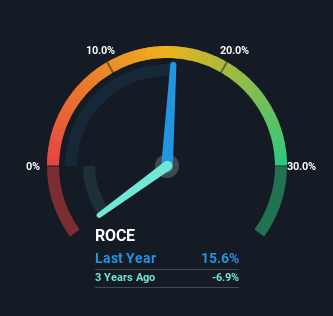- United States
- /
- Entertainment
- /
- NasdaqGS:WMG
Warner Music Group (NASDAQ:WMG) Is Looking To Continue Growing Its Returns On Capital

Finding a business that has the potential to grow substantially is not easy, but it is possible if we look at a few key financial metrics. Typically, we'll want to notice a trend of growing return on capital employed (ROCE) and alongside that, an expanding base of capital employed. If you see this, it typically means it's a company with a great business model and plenty of profitable reinvestment opportunities. So when we looked at Warner Music Group (NASDAQ:WMG) and its trend of ROCE, we really liked what we saw.
Understanding Return On Capital Employed (ROCE)
Just to clarify if you're unsure, ROCE is a metric for evaluating how much pre-tax income (in percentage terms) a company earns on the capital invested in its business. Analysts use this formula to calculate it for Warner Music Group:
Return on Capital Employed = Earnings Before Interest and Tax (EBIT) ÷ (Total Assets - Current Liabilities)
0.16 = US$758m ÷ (US$8.2b - US$3.3b) (Based on the trailing twelve months to June 2023).
Thus, Warner Music Group has an ROCE of 16%. In absolute terms, that's a satisfactory return, but compared to the Entertainment industry average of 9.6% it's much better.
Check out our latest analysis for Warner Music Group

In the above chart we have measured Warner Music Group's prior ROCE against its prior performance, but the future is arguably more important. If you'd like to see what analysts are forecasting going forward, you should check out our free report for Warner Music Group.
What The Trend Of ROCE Can Tell Us
The trends we've noticed at Warner Music Group are quite reassuring. The data shows that returns on capital have increased substantially over the last five years to 16%. Basically the business is earning more per dollar of capital invested and in addition to that, 40% more capital is being employed now too. This can indicate that there's plenty of opportunities to invest capital internally and at ever higher rates, a combination that's common among multi-baggers.
On a separate but related note, it's important to know that Warner Music Group has a current liabilities to total assets ratio of 40%, which we'd consider pretty high. This can bring about some risks because the company is basically operating with a rather large reliance on its suppliers or other sorts of short-term creditors. While it's not necessarily a bad thing, it can be beneficial if this ratio is lower.
The Bottom Line
A company that is growing its returns on capital and can consistently reinvest in itself is a highly sought after trait, and that's what Warner Music Group has. Investors may not be impressed by the favorable underlying trends yet because over the last three years the stock has only returned 16% to shareholders. So with that in mind, we think the stock deserves further research.
Warner Music Group does have some risks, we noticed 2 warning signs (and 1 which is concerning) we think you should know about.
If you want to search for solid companies with great earnings, check out this free list of companies with good balance sheets and impressive returns on equity.
Valuation is complex, but we're here to simplify it.
Discover if Warner Music Group might be undervalued or overvalued with our detailed analysis, featuring fair value estimates, potential risks, dividends, insider trades, and its financial condition.
Access Free AnalysisHave feedback on this article? Concerned about the content? Get in touch with us directly. Alternatively, email editorial-team (at) simplywallst.com.
This article by Simply Wall St is general in nature. We provide commentary based on historical data and analyst forecasts only using an unbiased methodology and our articles are not intended to be financial advice. It does not constitute a recommendation to buy or sell any stock, and does not take account of your objectives, or your financial situation. We aim to bring you long-term focused analysis driven by fundamental data. Note that our analysis may not factor in the latest price-sensitive company announcements or qualitative material. Simply Wall St has no position in any stocks mentioned.
About NasdaqGS:WMG
Warner Music Group
Operates as a music entertainment company in the United States, the United Kingdom, Germany, and internationally.
Proven track record and fair value.


